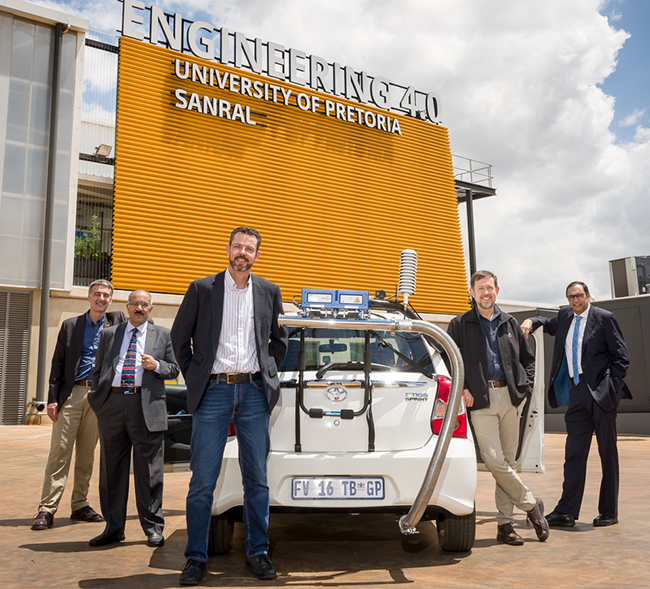University of Pretoria’s Centre for Transport Development acquires Africa’s first portable emissions measurement system
New Delhi: The Centre for Transport Development in the Faculty of Engineering, Built Environment and Information Technology at the University of Pretoria (UP) has acquired a portable emissions measurement system (PEMS), which can measure vehicle emissions while driving. The centre is a multidisciplinary research group that involves various engineering departments. The PEMS unit is a first for Africa.
“It [the system] connects to the exhaust of a light or heavy vehicle, or even off-road equipment,” explains Professor Johan W Joubert of the Department of Industrial and Systems Engineering. “It allows one to measure a variety of pollutants while driving under real and regular conditions.”
He and his team are building a database of emissions and vehicle diagnostics for a range of road types and vehicle loads in Gauteng. The current cohort of test vehicles includes the University’s fleet of light vehicles and the National Research Foundation’s road rail vehicle (RRV), a heavy-goods vehicle.
Prof Joubert explains that his team’s research has two main goals. “Firstly, to study and understand the uncertainty and variance in vehicle emissions in the local environment – how do our South African vehicles really perform? If we do not know – and we don’t – then we’ll be poking blindly in the dark to try to improve the state of transport emissions.” The second aim is to inform policy when it comes to setting realistic carbon emissions targets. “The reality of carbon tax as one intervention is on the cards. South Africa’s new carbon tax law was passed recently. In an attempt to mitigate the impact of climate change, the government will now be taxing greenhouse-gas emissions. The tax is applicable to anyone.”
But, he cautions, if we get the implementation wrong, it could have unintended consequences that will hurt the economy and citizens. The carbon tax is currently accounted for as part of the fuel levy. It is an easy approach to implement, but might be more regressive than alternative measures. “The impact could be disproportionately high on, for example, urban freight carriers. Higher fuel costs directly impact the cost of logistics and, generally, doing business. The higher cost of logistics, in turn, will ultimately manifest itself in higher prices for goods and services at your local retail outlet.”
Prof Joubert says government’s urging of the public to buy electric or hybrid vehicles is idealistic. “It might be achievable for the financial elite only, thereby adversely compounding economic inequality.”
New vehicles are sold with compulsory fuel consumption and emission declarations. But new vehicle owners are most likely never going to experience that (ambitious) consumption and emission performance. This is because the declared values are the result of standardised tests in highly controlled laboratory environments. The difference in performance is attributed to, for instance, driver behaviour, road grade and environmental conditions. Prof Joubert explains that the infamous Volkswagen diesel scandal, among others, sparked a global movement to enhance vehicle certification to include real driving emissions (RDE) testing.
“South Africans experience the real effect of transport emissions daily in our cities. On average, our vehicle population is much older than the developed world, which eagerly subscribes to and seeks to reach the UN’s Sustainable Development Goals. We should diligently pursue them too. Unfortunately, our ageing vehicles emit much more than their reported emissions because real people drive them.” Driving a vehicle under normal road conditions in a typical South African road environment will result in substantially higher (total) emissions than that vehicle’s certified values. Yet, the real emissions are what citizens are exposed to.
He said the University, its Faculty of Engineering, Built Environment and Information Technology, and the Department of Science and Innovation through the Research, Development and Innovation Waste Roadmap are working towards building smart cities that require smart mobility. “The multidisciplinary Centre for Transport Development is providing evidence-based research to make smart a reality.” The centre applies several smart technologies to various aspects of transport, from detailed pavement design and road vehicle interactions, travel and driver behaviour to higher level logistics and supply chain modelling. While all modes of transport are covered, the centre has particular competencies in road (both on- and off-road) and rail.

